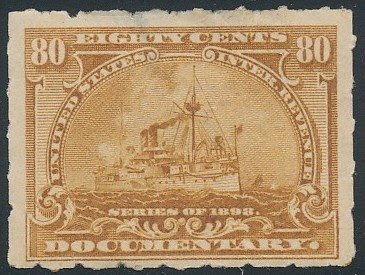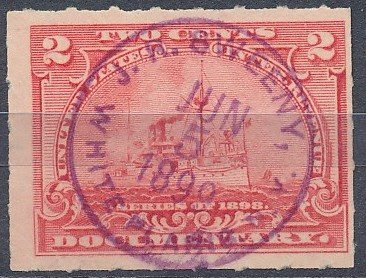 Albany, New York
Albany, New YorkSaturday, May 30, 2009
Friday, May 29, 2009
Battleship Revenues: 80 Cent Documentary
The 1898 act that authorized this series of tax stamps resulted in the printing of 9 values of documentary stamps, exclusive of the 4o and 80 cent values by July 1, 1898, the first day the taxes went into effect. The 80 cent and 40 cent values were added to the series in October 1898, mostly for use on insurance policies. Whatever they were used for, they are the scarcest values of the series, especially the hyphen hole versions of the stamps. Less then three million copies of the 80 cent stamp were printed, including both roulette and hyphen hole versions.
 80 Cent Documentary unused roulette. Hinge caused thin at top.
80 Cent Documentary unused roulette. Hinge caused thin at top.
 80 Cent Documentary unused roulette. Hinge caused thin at top.
80 Cent Documentary unused roulette. Hinge caused thin at top.Cancel Styles: Ovals
Oval handstamp cancels.
 2 Cent Documentary roulette. Left side arrow and guideline at top. Simple oval.
2 Cent Documentary roulette. Left side arrow and guideline at top. Simple oval.
 2 Cent Documentary roulette. Simple oval. Chicago, Indianapolis and Louisville Railway.
2 Cent Documentary roulette. Simple oval. Chicago, Indianapolis and Louisville Railway.
 2 Cent Documentary roulette. Double oval. Forest City Stone was a quarry operator in Ohio.
2 Cent Documentary roulette. Double oval. Forest City Stone was a quarry operator in Ohio.
 2 Cent Documentary roulette. Double oval.
2 Cent Documentary roulette. Double oval.
 2 Cent Documentary roulette. Simple oval. This cancel is remarkable. Without doing any historical research on just who Henry Belin was, a check in the Scranton Yellow Pages for life insurance will yield Henry Belin IV and Associates as reps of Northwestern Mutual Life. Good business genes.
2 Cent Documentary roulette. Simple oval. This cancel is remarkable. Without doing any historical research on just who Henry Belin was, a check in the Scranton Yellow Pages for life insurance will yield Henry Belin IV and Associates as reps of Northwestern Mutual Life. Good business genes.
 2 Cent Documentary roulette. Left side arrow and guideline at top. Simple oval.
2 Cent Documentary roulette. Left side arrow and guideline at top. Simple oval. 2 Cent Documentary roulette. Simple oval. Chicago, Indianapolis and Louisville Railway.
2 Cent Documentary roulette. Simple oval. Chicago, Indianapolis and Louisville Railway. 2 Cent Documentary roulette. Double oval. Forest City Stone was a quarry operator in Ohio.
2 Cent Documentary roulette. Double oval. Forest City Stone was a quarry operator in Ohio. 2 Cent Documentary roulette. Double oval.
2 Cent Documentary roulette. Double oval. 2 Cent Documentary roulette. Simple oval. This cancel is remarkable. Without doing any historical research on just who Henry Belin was, a check in the Scranton Yellow Pages for life insurance will yield Henry Belin IV and Associates as reps of Northwestern Mutual Life. Good business genes.
2 Cent Documentary roulette. Simple oval. This cancel is remarkable. Without doing any historical research on just who Henry Belin was, a check in the Scranton Yellow Pages for life insurance will yield Henry Belin IV and Associates as reps of Northwestern Mutual Life. Good business genes. These 5 stamps could be the start of a color study for the 2 cent doc.
Tuesday, May 26, 2009
Railroad Cancels: Rutland Railroad

2 cent documentary roulette, upper and left guidelines.
The Rutland Railroad operated from 1843 to 1963, primarily in the state of Vermont, though itserved Quebec and New York State.
There are many sites devoted to the Rutland Railroad including: http://users.rcn.com/jimdu4/
Monday, May 25, 2009
Cancel Styles: The Decipede


Here are examples of a fairly common handstamp style that I call the Decipede. Beyond its lettering the style is characterized by a rectangular box with 10 wavy lines emerging from its sides that look something like the legs of bug. In most cases of this style that I have seen, Chicago is at the bottom. Bulk packet sorting of battleship documentaries will often yield at least one of these types of cancels.
In most cases on the top side of the box of the cancellation is a set of initials. In the stamp below though is a common name found on this type of cancel, F.J. Hohing.

In most cases on the top side of the box of the cancellation is a set of initials. In the stamp below though is a common name found on this type of cancel, F.J. Hohing.

Battleship Revenues: 4 Cent Documentary
Taxes at 4 cents were:
Bills of exchange (foreign) or letters of credit (including orders by telegraph or otherwise for the payment of money issued by express or other companies or any person or persons), drawn in but payable out of the U.S., if drawn singly, according to the customs of merchants or bankers, for each $100 or fraction thereof.
 Used roulette single.
Used roulette single.
Bills of exchange (foreign) or letters of credit (including orders by telegraph or otherwise for the payment of money issued by express or other companies or any person or persons), drawn in but payable out of the U.S., if drawn singly, according to the customs of merchants or bankers, for each $100 or fraction thereof.
 Used roulette single.
Used roulette single.Battleship Revenues: 5 Cent Documentary
 Unused roulette single.
Unused roulette single. Used hyphen hole single
Used hyphen hole single Unused 5 cent documentary hyphen hole block of 4. Upper left stamp scuffed.
Unused 5 cent documentary hyphen hole block of 4. Upper left stamp scuffed.TAXES: A single explicit 5 cent tax was levied for each $100 of value or fraction thereof for bonds, debentures, certificates of indebtedness, and new issues of stock.
5 cent documentary stamps were often used by insurance companies to pay taxes on insurance policies.
Battleship Revenues: 3 Cent Documentary
No explicit documentary tax was specified at a value of 3 cents; the 3 cent documentary stamp was used to pay increments of other taxes assessed at higher or lower rates.
As can be seen below, the 3 cent battleship blue tends to obscure cancels.
 Used hyphen hole single.
Used hyphen hole single.
As can be seen below, the 3 cent battleship blue tends to obscure cancels.
 Used hyphen hole single.
Used hyphen hole single.Sunday, May 24, 2009
Battleship Cancels by State: Texas
 Paris, Texas handstamp. Incomplete company name of Forwood & xxx.
Paris, Texas handstamp. Incomplete company name of Forwood & xxx.I have been in both Palestine and Paris, just not in Texas!
RAPHAEL BROS.
1899
Houston, Tex.
Cancel for May 24: The Milwaukee Road
 Featured in a previous post, the Milwaukee Road aka Chicago, Milwaukee and St. Paul Railway cancelled this stamp on May 24 1901 with a circular dated handstamp.
Featured in a previous post, the Milwaukee Road aka Chicago, Milwaukee and St. Paul Railway cancelled this stamp on May 24 1901 with a circular dated handstamp.Saturday, May 23, 2009
Express Cancels: American Express
American Express started as an express mail business in New York State in 1850, founded by the merger of the express companies owned by Henry Wells , William Fargo, and John Warren Butterfield. Wells and Fargo also started Wells Fargo in 1852 when their partner Butterfield objected to American Express extending its operations to California. Wells Fargo cancels on the one cent battelship can also be found on this site.
American Express extended its capacity by affiliating with other express companies nationwide, including Wells Fargo, railroads, and steamship companies.
American Express was such a powerful monopoly by the start of the Theodore Roosevelt Administration that Roosevelt had the Interstate Commerce Commission investigate the company. The ICC was concerned by its control of the railroad express business. Little was done about the situation until World War One, however.
 Early Amex printed cancels on the 1898s were made with serif lettering like that above.
Early Amex printed cancels on the 1898s were made with serif lettering like that above.
 Amex moved to sans serif lettering like the printed cancels in the block above.
Amex moved to sans serif lettering like the printed cancels in the block above.
 Amex hand stamp on the 5 cent documentary.
Amex hand stamp on the 5 cent documentary.
 Receipt of goods for shipment by Amex with 1 cent Franklin postage stamp overprinted I.R. (Internal Revenue) to indicate its use as a revenue stamp.
Receipt of goods for shipment by Amex with 1 cent Franklin postage stamp overprinted I.R. (Internal Revenue) to indicate its use as a revenue stamp.
American Express extended its capacity by affiliating with other express companies nationwide, including Wells Fargo, railroads, and steamship companies.
American Express was such a powerful monopoly by the start of the Theodore Roosevelt Administration that Roosevelt had the Interstate Commerce Commission investigate the company. The ICC was concerned by its control of the railroad express business. Little was done about the situation until World War One, however.
 Early Amex printed cancels on the 1898s were made with serif lettering like that above.
Early Amex printed cancels on the 1898s were made with serif lettering like that above. Amex moved to sans serif lettering like the printed cancels in the block above.
Amex moved to sans serif lettering like the printed cancels in the block above. Amex hand stamp on the 5 cent documentary.
Amex hand stamp on the 5 cent documentary. Receipt of goods for shipment by Amex with 1 cent Franklin postage stamp overprinted I.R. (Internal Revenue) to indicate its use as a revenue stamp.
Receipt of goods for shipment by Amex with 1 cent Franklin postage stamp overprinted I.R. (Internal Revenue) to indicate its use as a revenue stamp. Woodrow Wilson commandeered the railroads to move soldiers, their supplies and coal, in 1917. Eventually, all contracts between express companies and railroads were nullified by the government and all existing express companies were consolidated into a single company to serve the country's needs. The result was a new company called the American Railway Express Agency, formed in July 1918. The new entity took custody of all the equipment and property of existing express companies (the largest share of which, 40%, came from American Express, who had owned the rights to the express business over 71,280 miles (114,710 km) of railroad lines, and had 10,000 offices, with over 30,000 employees). As a result, American Express would become almost exclusively a financial services company, with little left of its express business.
Friday, May 22, 2009
Express Cancels: Wetherell's Express
 Wetherell's Express handstamp on American Express 1900 printed cancel.
Wetherell's Express handstamp on American Express 1900 printed cancel.One cent hyphen hole with right-side guideline.
Back on May 14, the tax provision was reviewed that required express companies to pay documentary taxes. As a reminder, taxed a one cent were bills of lading, manifests, or other memorandum of shipment for goods shipped by railroad or steamboat company, carrier, express company, or corporation.
Thursday, May 21, 2009
Subscribe to:
Posts (Atom)



























